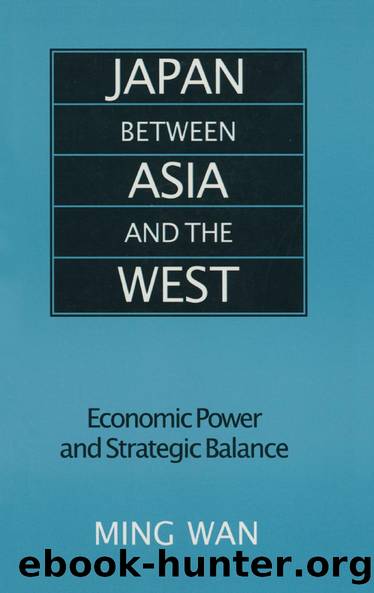Japan Between Asia and the West: Economic Power and Strategic Balance by Ming Wan

Author:Ming Wan [Wan, Ming]
Language: eng
Format: epub
Tags: History, Asia, General, Social Science, Ethnic Studies, Regional Studies
ISBN: 9781315499277
Google: JWelDAAAQBAJ
Publisher: Routledge
Published: 2016-07-08T16:17:55+00:00
Source: Yomiuri Daily, September 19, 1996, p. 10. The surveys were conducted, with samples of about 1,000 each, in the countries so named in MayâJuly 1996. Margins of errors not provided.
Note: Questions were translated and numbered by the author.
Notes
1. Charles Kindleberger, The World in Depression, 1929â1939, p. 289.
2. Susan J. Pharr and Ming Wan, âJapanâs Leadership,â pp. 135â36.
3. Nishigaki and Shimomura, âJapanâs Aid,â p. 30.
4. There is surely dissent in Japan. Japanese critics among academics, journalists, and politicians have questioned the motives, approaches, and effects of Japanâs ODA programs. See Yasutomo, New Multilateralism in Japanâs Foreign Policy, pp. 16â26. But their views do not significantly affect Japanese decision-making.
5. For just one citation, see David E. Sanger, âPower of the Yen Winning Asia: New âCo-prosperityâ Is Displacing U.S.,â New York Times, December 5, 1991, D1.
6. Walter Hatch and Kozo Yamamura, Asia in Japanâs Embrace: Building a Regional Production Alliance (New York: Cambridge University Press, 1996).
7. Dennis J. Encarnation, Rivals Beyond Trade, p. 152.
8. Sueo Sudo, The Fukuda Doctrine and ASEAN: New Dimensions in Japanese Foreign Policy (Singapore: Institute of Southeast Asian Studies, 1992), pp. 2â3.
9. Japan paid $10.6 million for receiving trainees from Asia and sending Japanese experts to Asian countries. Japanâs ODA 1994, pp. 12â13.
10. Keizai kyoryoku no genjo to mondaiten, 1987, pp. 4â6. Japanâs official reparations were completed in July 1976 and its compensations were completed in April 1977.
11. Yamakage Susumu, âAjia taiheiyo to nihonâ [Asian Pacific region and Japan], in Watanabe Akio, ed., Sengo nihon no taigai seisaku [Postwar Japanese foreign policy] (Tokyo: Yuhikaku, 1985), pp. 136â43.
12. Sudo, Fukuda Doctrine and ASEAN, pp. 44â48.
13. Japanâs ODA 1994, p. 13.
14. Alan Rix, Japanâs Economic Aid, pp. 32â34.
15. Michael Schaller, Altered States, pp. 96â112.
16. The bilateral trade volume experienced ups and downs due to political factors, varying from $151 million (2.6 percent of Japanâs total) in 1956 to $23.5 million (0.3 percent) in 1960. The bilateral trade steadily grew in the 1960s, from $47.5 million (0.5 percent) in 1961 to $901 million (2.06 percent) in 1971, right before Nixonâs visit to China. Trade data between 1950 and 1963 are from Hiroshi Yashiki, Nichu boeki annai [Information of Japan-China trade] (Tokyo: Nihon keizai shimbunsha, 1964), p. 159. He used custom statistics compiled by MOF. Trade data after 1964 are from the Japanese Ministry of Finance, Financial Statistics of Japan, various years.
17. Ogata Sadako, âJapanese Attitudes toward China,â Asian Survey 5, no. 8 (August 1965), p. 389.
18. Schaller, Altered States, pp. 77â95.
19. Thomas R. Havens, Fire Across the Sea: The Vietnam War and Japan, 1965â1975 (Princeton: Princeton University Press, 1987).
20. Sudo, Fukuda Doctrine and ASEAN, pp. 91, 102â109, 244; Marjorie L. Suriyamongkol, Politics of ASEAN Economic Cooperation: The Case of ASEAN Industrial Projects (Singapore: Oxford University Press, 1988), pp. 164â215.
21. For Sino-Japanese economic relations in this period, see Chae-Jin Lee, China and Japan: New Economic Diplomacy (Stanford: Hoover Institution Press, 1984).
22. Juichi Inada, âStick or Carrot? Japanese Aid Policy and Vietnam,â in Bruce M. Koppel and Robert M. Orr, Jr., eds., Japanâs Foreign Aid: Power and Policy in a New Era (Boulder: Westview, 1993), pp.
Download
This site does not store any files on its server. We only index and link to content provided by other sites. Please contact the content providers to delete copyright contents if any and email us, we'll remove relevant links or contents immediately.
Harry Potter and the Goblet Of Fire by J.K. Rowling(3040)
Never by Ken Follett(2879)
Shadow of Night by Deborah Harkness(2718)
Ogilvy on Advertising by David Ogilvy(2682)
Zero to IPO: Over $1 Trillion of Actionable Advice from the World's Most Successful Entrepreneurs by Frederic Kerrest(2389)
The Man Who Died Twice by Richard Osman(2297)
Machine Learning at Scale with H2O by Gregory Keys | David Whiting(2287)
Book of Life by Deborah Harkness(2263)
How Proust Can Change Your Life by Alain De Botton(2259)
My Brilliant Friend by Elena Ferrante(2223)
0041152001443424520 .pdf by Unknown(2219)
The Tipping Point by Malcolm Gladwell(2204)
How to Pay Zero Taxes, 2018 by Jeff A. Schnepper(2098)
Will by Will Smith(2040)
Purple Hibiscus by Chimamanda Ngozi Adichie(1981)
Hooked: A Dark, Contemporary Romance (Never After Series) by Emily McIntire(1955)
Borders by unknow(1785)
Rationality by Steven Pinker(1764)
Daughter of Smoke and Bone by Laini Taylor(1742)
